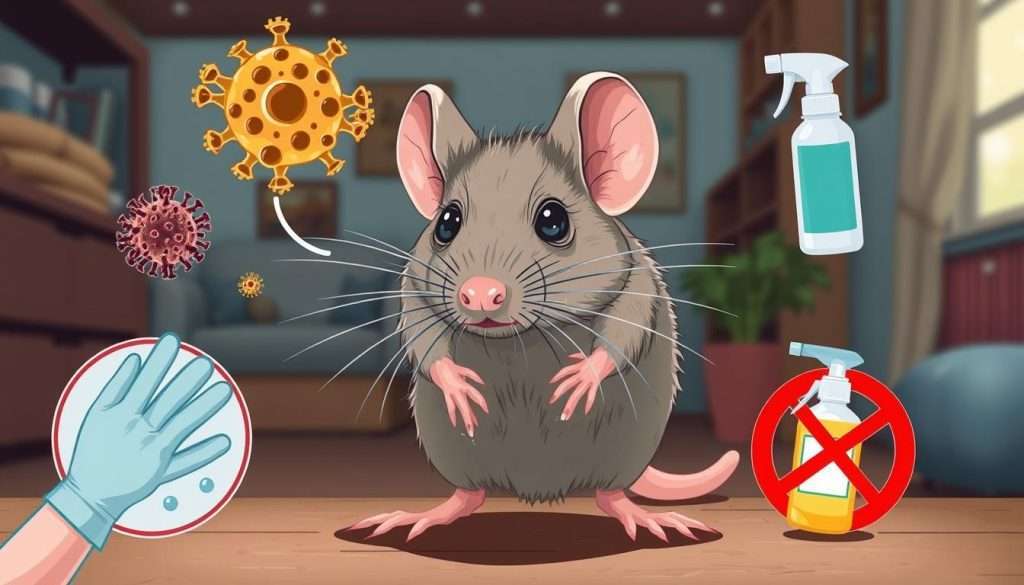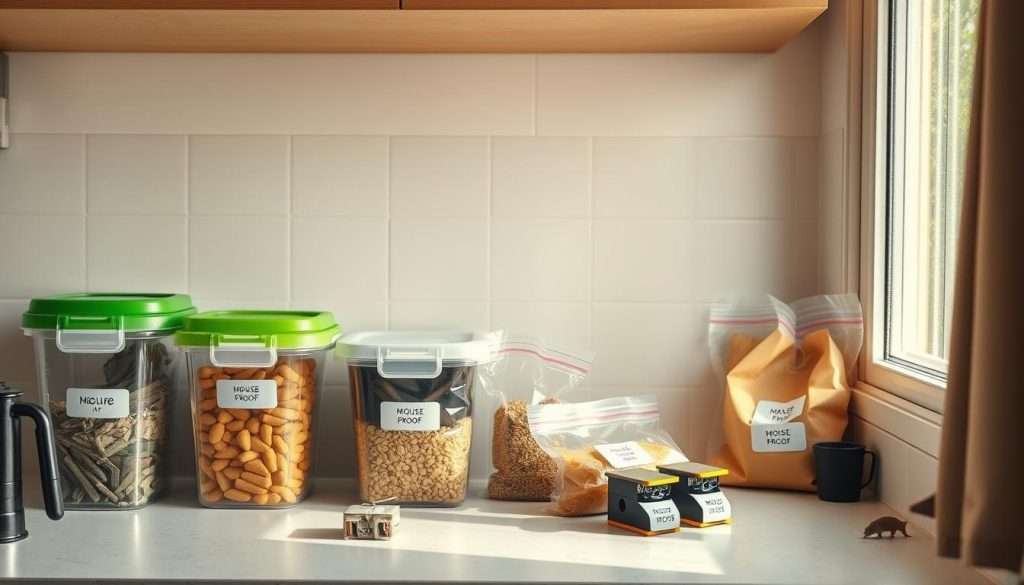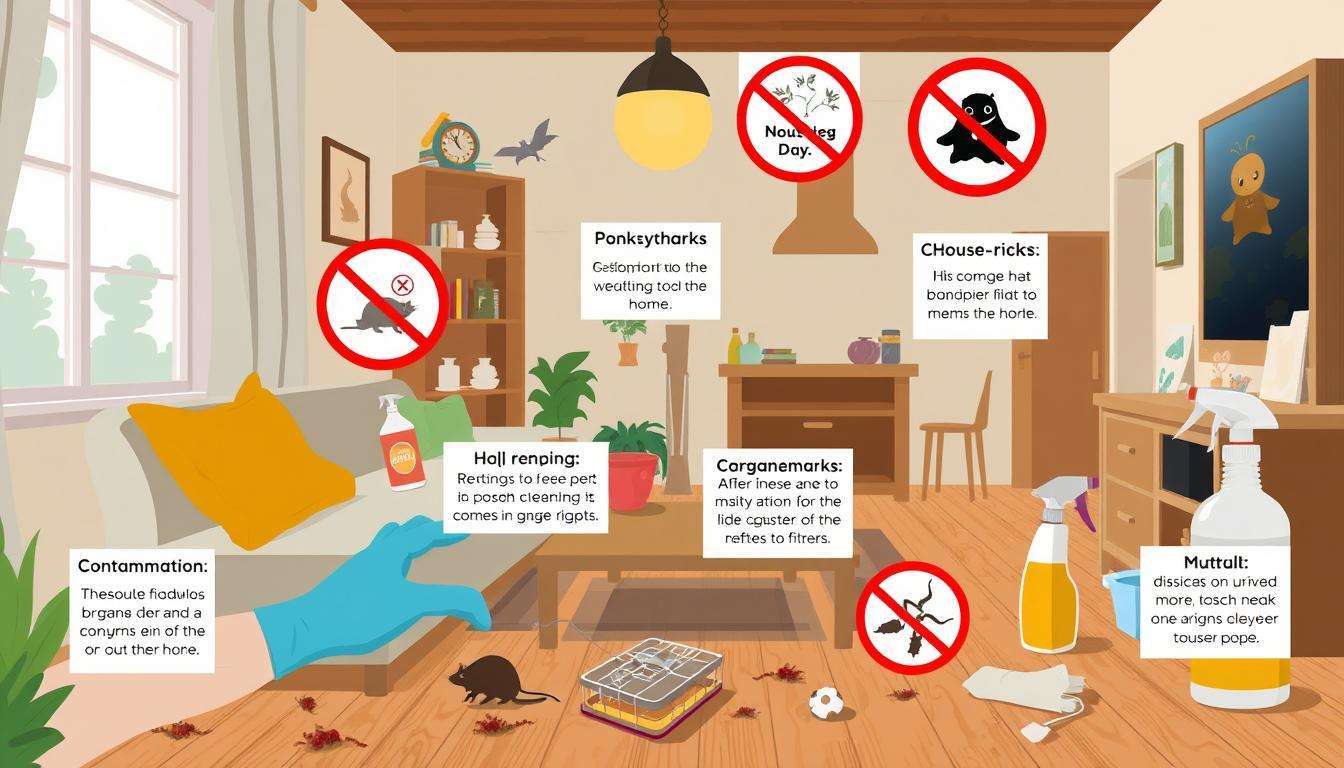House mice are common in many homes in the United States. They are small and usually not aggressive. But, their presence can mean health risks. The question “do house mice bite?” is important for homeowners.
In this safety guide, we will look at mouse behavior and their biting habits. We will also talk about health risks and how to treat and prevent them.
Key Takeaways
- House mice may bite when threatened or cornered, but bites are relatively rare.
- Mice can transmit diseases through bites and contaminated waste, posing health risks.
- Maintaining a clean environment minimizes the chances of mouse infestations.
- Identifying signs of mice, such as droppings and gnaw marks, can prevent health issues.
- Following proper first aid and when to seek medical attention is essential for mouse bites.
- Effective mouse-proofing can help protect your home from these invasive pests.
Understanding House Mice
House mice are both interesting and annoying. By understanding house mice, their habits, and traits, homeowners can fight them better. These small rodents, known as Mus musculus, are about 2.5 to 4 inches long. They are most active at night, making them hard to spot.
They live in groups, which can make infestations worse.
Characteristics and Behavior of House Mice
House mouse behavior is key to understanding them. They have smooth, light brown to black fur and lighter bellies. Their ears are pointy, and their tails can be up to 4 inches long.
Their droppings are rod-shaped and pointed at both ends. House mice are shy and may hide when they see people. They love to explore and find food.
Why House Mice Enter Homes
Knowing why mice enter homes helps homeowners. House mice look for warmth and safety from cold and predators. They can fit through tiny cracks, making it easy for them to get inside.
Once inside, they see your home as a food source. This can spread diseases like salmonella and lymphocytic choriomeningitis. Keeping your home clean and using pest control services can help keep you safe from health risks.
Do House Mice Bite?
Understanding house mice behavior is key to knowing about bites. House mice are not usually aggressive. But, they might bite if they feel threatened. Knowing why they bite helps us stay safe.
Reasons for Biting
House mice bite when they feel trapped or scared. They try to avoid humans, but sometimes they can’t. It’s important to handle them carefully to avoid bites.
Injury Risk from House Mouse Bites
Mouse bites can be risky for our health. Their saliva can carry harmful bacteria and viruses. This can lead to infections.
For example, rat-bite fever can start within 3 to 10 days. If not treated, it can be very dangerous. While diseases like hantavirus are rare, it’s still important to be careful.
House Mouse Bite Symptoms
It’s important to know how to spot mouse bites. These bites look like small holes in your skin. Spotting them early helps you get the right treatment.
What Does a Mouse Bite Look Like?
Mouse bites show up as:
- Small puncture wounds
- Possible redness and swelling around the affected area
- Bluish discoloration if there is bleeding
These signs can change based on the bite’s severity and how you react. Some bites are minor, but others can be serious if not treated. Watching for these signs helps you spot mouse bites correctly.
Pain and Reaction to Mouse Bites
How you feel from a mouse bite can vary. You might experience:
- Sharp pinching sensation at the time of the bite
- Mild to moderate pain afterward
- Swelling that may last for several days
Some people, like kids and the elderly, might have worse reactions. If your symptoms get worse or you have a fever or joint pain, see a doctor right away. Most mouse bites can be treated at home, but you should still be careful.
Health Risks Associated with House Mouse Bites
It’s important to know the health risks of mouse bites. House mice can spread serious diseases. These bites can cause symptoms that might need medical help. Knowing about these diseases helps you stay safe.
Diseases Transmitted through Bites
Mouse bites can cause several illnesses. The lymphocytic choriomeningitis virus (LCMV) is found in about 5% of house mice. It can spread through contact with infected saliva or bites. Pregnant women should seek medical help if they think they have LCM infection.
Other diseases mice can spread include:
- Hantavirus: It causes severe breathing problems and can spread through mouse droppings and bites.
- Leptospirosis: This bacterial infection can cause flu-like symptoms and serious problems if not treated.
- Rat-bite fever: It’s caused by bacteria and can lead to fever and joint pain from bites or scratches.
For more information, visit this resource.
Potential for Infection
Bites from mice can lead to infections. Bacteria in mouse saliva can get into your blood. This can cause a range of health problems.
Symptoms can be mild or severe. Mice can also carry pathogens that cause diseases like hantavirus pulmonary syndrome. This is rare but can happen from exposure to infected droppings, urine, or saliva.

To avoid infections, don’t clean up mouse droppings without proper gear. This stops airborne pathogens from causing serious health issues. Always get professionals to handle rodent-related hazards safely.
House Mouse Bite Treatment
Getting bitten by a mouse can be scary. But, knowing how to treat it can help. It’s important to act fast and carefully to avoid infection and help it heal.
Immediate First Aid Steps
Here’s what to do if you get bitten by a mouse:
- Wash the bite with mild soap and warm water for at least five minutes.
- Dry it with a clean, soft cloth.
- Apply an antiseptic solution like hydrogen peroxide or rubbing alcohol.
- Cover it with a clean bandage to protect it.
- Elevate the area if you can to reduce swelling.
- Use an over-the-counter antibiotic ointment to prevent infection.
Watch the bite for signs of infection. Look for increased pain, redness, warmth, swelling, or pus. These could mean you need to see a doctor.
When to Seek Medical Attention
It’s important to know when to see a doctor for mouse bites. If you notice:
- Significant pain or swelling that gets worse.
- Deep wounds or heavy bleeding that won’t stop.
- Symptoms of infection like fever or pus.
- Uncertainty about your tetanus vaccination status, especially if it’s been over 5-10 years.
Seeing a doctor quickly might mean they give you antibiotics. This is important because some mice can carry harmful germs. Quick action can make a big difference.
| Signs | Action |
|---|---|
| Increased redness | Seek medical attention |
| Swelling or warmth | Clean and monitor |
| Pain worsening | Consult healthcare professional |
| Heavy bleeding | Visit emergency room |
| Signs of infection | Request antibiotics |
Preventing House Mouse Bites
It’s important to take steps to stop house mouse bites. Homeowners can lower the chance of mouse problems. One key step is to mouse-proof your home, making sure mice can’t get in.
Mouse-Proofing Your Home
To mouse-proof your home, follow these steps:
- Seal cracks and crevices in walls, around doors, and where utilities enter your home.
- Use steel wool or caulk to block off potential entry points, as mice can squeeze through openings as small as 1/4 inch.
- Install door sweeps to prevent mice from sneaking in under doors.
- Repair damaged screens on windows and vents to further deter their entry.
Reducing Attractiveness of Your Space to Mice
To make your home less appealing to mice, remove food sources and hiding spots:
- Store food in airtight containers to avoid attracting mice with easy access to snacks.
- Keep your home clean by promptly cleaning up spills and crumbs that may invite a mouse encounter.
- Reduce clutter in and around the home, as mice thrive in environments where they can find shelter.

Conclusion
Knowing if house mice bite and the health risks is key for homeowners. House mice can sneak into homes through tiny openings. Spotting their signs, like droppings and nests, helps you protect your home.
To keep mice away, use hard-sided containers for food, screens on windows, and keep doors shut. If bitten, treating the wound right is crucial. This helps avoid infections or diseases from mouse bites.
By taking steps to reduce mouse-related health risks, you make your home safer. With the right knowledge and actions, you can handle mouse encounters well. This keeps your living space healthy.
